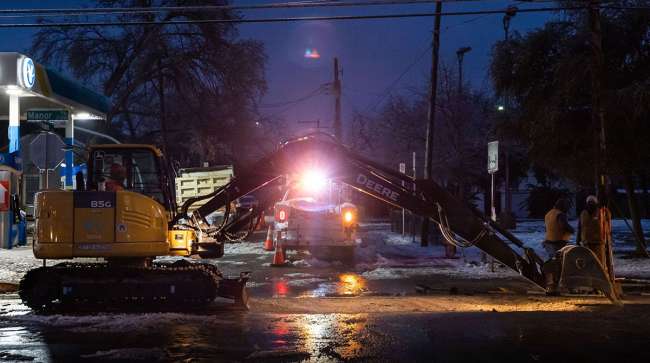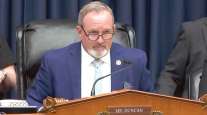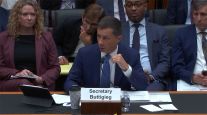Senior Reporter
House Democrats Ready to Address Climate Crisis, Pallone Says

[Stay on top of transportation news: Get TTNews in your inbox.]
Power outages in Texas and recent severe weather events around the country justify congressional Democrats’ policy directives on climate change, the chairman of the influential Energy and Commerce Committee said.
RELATED: House panel to include climate policy in infrastructure bill
Rep. Frank Pallone (D-N.J.), the committee’s leader, indicated the massive failures to Texas’ energy grid, as well as high-profile floods, forest fires, and hurricane are influencing decision-making pertaining to an infrastructure policy bill. In the coming weeks, the Democratic leadership in the U.S. House of Representatives intends to pursue climate change-centric infrastructure proposals meant to facilitate access to renewable energy and electric vehicles.
“President [Joe] Biden has made the climate crisis a centerpiece of his administration and has already taken bold action to address climate change. I stand ready to work with him to enact comprehensive climate legislation and hope my Republican colleagues will join us in that effort,” Pallone said Feb. 18.

Pallone
His colleagues hosted a hearing on renewable energy policy, emphasizing programs that would increase federal investments in clean energy-centric grids. Biden has pledged to adopt a climate change infrastructure framework that would pave the way for greater access to renewable energy.
The chairman said, “These major outages also show that the climate crisis doesn’t differentiate between Red states and Blue states; the whole nation is being impacted by the climate crisis.”
An aspect of an infrastructure package is expected to center on commercial transportation. As the committee noted, the transportation sector is a major domestic contributor to greenhouse gases. The sector consists of cars, trucks, commercial aircraft, and railroads.
Transportation electrification is an option policymakers are considering for achieving long-term decarbonization objectives.
“Current projections estimate that the share of electric vehicles in new passenger fleet vehicle sales will be about 10-15% by 2025. Infrastructure must be significantly scaled up to meet this need,” according to analysis from the committee’s leadership. “Electrification using either batteries or fuel cells will ultimately require significant cost reductions in onboard storage and performance improvements, as well as expanded battery charging and hydrogen refueling infrastructure.”
Committee on Energy and Commerce Memorandum by Transport Topics on Scribd
Speaking to Energy and Commerce Committee members, Paula Glover with the Alliance to Save Energy contended that a push to establish electrification infrastructure would lead to job creation, as well as improvements to air quality. Her group recommends Congress authorize $3 billion in grants to install charging equipment along highways.
“The [U.S.] Department of Energy finds that, on average, it costs about half as much to fill up an [electric vehicle] than a conventionally fueled counterpart,” she said. “But a primary barrier to greater deployments of EVs is the availability of public charging infrastructure.”

What if you could prevent accidents and driver turnover before they happen? In this episode, host Seth Clevenger speaks with two technology CEOs to discuss how machine learning can enable better business decisions and a more proactive stance on safety. Hear a snippet, above, and get the full program by going to RoadSigns.TTNews.com.
Princeton University professor Stephen Pacala told lawmakers innovations meant to achieve net-zero emissions include next-generation energy programs for transportation, as well as improvements to energy storage.
“Although technology exists to decarbonize all parts of the energy system,” he said, “some sectors remain at pre-commercial or first-of-a-kind demonstration stages and will require significant improvement in cost and performance to become commercially viable. These include aviation, shipping, and industrial subsectors such as steel, cement and chemicals manufacturing.”
Top Republicans on the panel criticized Democrats’ support of environmental policies linked to progressive initiatives included in the Green New Deal manifesto. The Republicans pointed to the potential for hindering long-standing energy sectors if they were to be minimized or canceled.
“Absent major changes in our domestic mining and manufacturing base, increasing reliance on wind, solar, and electric batteries trades energy security for energy insecurity. It pushes carbon emissions offshore and increases reliance on Chinese supply chains. It does nothing meaningful for global climate change,” said Energy and Commerce Committee ranking member Rep. Cathy McMorris Rodgers (R-Wash.).
Want more news? Listen to today's daily briefing below or go here for more info:
“We all agree that America deserves a cleaner future, but pursuing a path towards that future while ignoring energy reliability is the wrong approach,” added Rep. Michael Burgess (R-Texas). “We must remove barriers slowing innovation to create jobs and provide affordable energy at home.”




